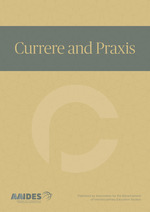Roles-based engagement in collaborative online discussions to promote EFL speaking
DOI:
https://doi.org/10.5281/zenodo.10257167Keywords:
Roles-based engagement, collaborative learning, online discussion, speaking EFLAbstract
This qualitative case study examines students’ perceptions of role-based engagement in collaborative online discussions to promote English as a foreign language (EFL) speaking. For this reason, semi-structured interviews were conducted with 28 students and one educator. The results showed that teachers applied three basic educators’ collaborative competencies (ECC) during online discussions. Thus, group activities are evident through the following: speaking skills (peer grammar repetition and peer pronunciation correction), cognitive boosting (criticizing and confirming specific opinions), social interaction (praising group accomplishments and help-seeking problem-solving), and collaborative skills. The study suggests more research into role-based discussions that occur on the spot or without teachers planning ahead, open-ended speaking diagnostic tasks, designs for online assessment and evaluation of speaking rubrics, fluency-oriented speaking tasks, and technology-assisted peer-learning assessments.
References
Al-Samarraie, H., & Saeed, N. (2018). A systematic review of cloud computing tools for collaborative learning: Opportunities and challenges to the blended-learning environment. Computers & Education, 124, 77-91. https://doi.org/10.1016/j.compedu.2018.05.016
Ardiningtyas, S. Y., Butarbutar, R., Weda, S., & Nur, S. (2023). Online scaffolding behavior for speaking EFL improvement: narrative inquiry issues. Interactive Learning Environments, 1-11. https://doi.org/10.1080/10494820.2023.2207608
Babiker, A. (2018). Improving speaking skills in EFL classes through collaborative learning. American Scientific Research Journal for Engineering, Technology, and Sciences (ASRJETS), 44(1), 137-154.
Bailey, K. M., & Nunan, D. (2005). Practical English language teaching: Speaking. McGraw-Hill.
Bailey, K. M., & Savage, L. (1994). New ways in teaching speaking. Teachers of English to Speakers of other languages, Inc. (TESOL).
Benne, K. D., & Sheats, P. (1948). Functional roles of group members. Journal of Social Issues, 4(2), 41–49. https://doi.org/10.1111/j.1540-4560.1948.tb01783.x
Benne, K. D., & Sheats, P. (2020). Functional roles of group members. In S. L. Tubbs & R. M. Carter (Eds.), Shared Experiences in Human Communication (pp. 155-163). Routledge.
Braun, V., Clarke, V., Hayfeld, V., Davey, L., & Jenkinson, E. (2022). Doing reflexive thematic analysis. In S. Bager-Charleson & A. G. McBeath (Eds.), Supporting research in counselling and psychotherapy qualitative, quantitative, and mixed methods research (pp. 19–38). Palgrave Macmillan. https://doi.org/10.1007/978-3-031-13942-0_2
Butarbutar, R. (2018). Analyzing nonverbal communication in seminar presentation. Magistra: Jurnal Keguruan Dan Ilmu Pendidikan, 5(1), 038-047.
Butarbutar, R. (2021). Learner’s perception of task difficulties in technology-mediated task-based language teaching. Englisia: Journal of Language, Education, and Humanities, 9(1), 129-144. https://doi.org/10.22373/ej.v9i1.10079
Butarbutar, R., & Leba, S. M. R. (2023). Teachers’ perspectives on teaching EFL speaking virtually: A case study of COVID-19 pandemic survival. American Journal of Social Sciences and Humanities, 8(1), 46-54.
Butarbutar, R., Leba, S. M. R., Weda, S., & Nur, S. (2023a). Computer-supported collaborative learning-based instruction in teaching speaking EFL in Indonesian context. In 4th International Conference on Progressive Education 2022 (ICOPE 2022) (pp. 116-126). Atlantis Press.
Butarbutar, R., Ruing, F. H., Basri, N., Tuharea, V. U., & Leba, S. M. R. (2023b). Unpacking online collaborative learning in teaching efl speaking: insights from triple case studies from rural areas. The Qualitative Report, 28(12), 3379-3401.
Butarbutar, R., Uspayanti, R., Manuhutu, N., & Palangngan, S. T. (2019, October). Analyzing of puzzle local culture-based in teaching English for young learners. In IOP Conference Series: Earth and Environmental Science (Vol. 343, No. 1, p. 012208). IOP Publishing. https://doi.org/10.1088/1755-1315/343/1/012208
Butarbutar, R., Weda, S., & Nur, S. (2023). Guided-blended collaborative learning in speaking class: Voices of non-native English teachers and students from eastern Indonesia. American Journal of Education and Learning, 8(1), 88-99. https://doi.org/10.55284/ajel.v8i1.890
Çakiroğlu, Ü., & Erdemir, T. (2019). Online project based learning via cloud computing: exploring roles of instructor and students. Interactive Learning Environments, 27(4), 547-566. https://doi.org/10.1080/10494820.2018.1489855
Chan, S. C., Wan, C. J., & Ko, S. (2019). Interactivity, active collaborative learning, and learning performance: The moderating role of perceived fun by using personal response systems. The International Journal of Management Education, 17(1), 94-102. https://doi.org/10.1016/j.ijme.2018.12.004
Chen, C. Y., Chang, S. C., Hwang, G. J., & Zou, D. (2021). Facilitating EFL learners’ active behaviors in speaking: A progressive question prompt-based peer-tutoring approach with VR contexts. Interactive Learning Environments, 31(4), 1-20. https://doi.org/10.1080/10494820.2021.1878232
Chen, M. R. A., & Hwang, G. J. (2022). Effects of experiencing authentic contexts on English speaking performances, anxiety and motivation of EFL students with different cognitive styles. Interactive Learning Environments, 30(9), 1619-1639. https://doi.org/10.1080/10494820.2020.1734626
Daradoumis, T., Martínez-Monés, A., & Xhafa, F. (2006). A layered framework for evaluating on-line collaborative learning interactions. International Journal of Human-Computer Studies, 64(7), 622-635. https://doi.org/10.1016/j.ijhcs.2006.02.001
Fatimah, S. (2019). Collaborative learning activities through MOE in engaging EFL learners and diminishing their speaking anxiety. English Language Teaching Educational Journal, 2(1), 39-49. https://doi.org/10.12928/eltej.v2i1.925
Gillies, R. M., & Boyle, M. (2010). Educator' reflections on cooperative learning: Issues of implementation. Teaching and educator Education, 26(4), 933-940.https://doi.org/10.1016/j.tate.2009.10.034
González‐Lloret, M. (2020). Interactivetasks for online language teaching. Foreign Language Annals, 53(2), 260-269. https://doi.org/10.1111/flan.12466
Hernández-Sellés, N., Muñoz-Carril, P. C., & González-Sanmamed, M. (2019). Computer-supported collaborative learning: An analysis of the relationship between interaction, emotional support and online collaborative tools. Computers & Education, 138, 1-12. https://doi.org/10.1016/j.compedu.2019.04.012
Hossain, S. F. A., Xi, Z., Nurunnabi, M., & Anwar, B. (2022). Sustainable academic performance in higher education: a mixed method approach. Interactive Learning Environments, 30(4), 707-720. https://doi.org/10.1080/10494820.2019.1680392
Hughes, R., & Reed, B. S. (2016). Teaching and researching speaking. United Kingdom.
Isohätälä, J., Näykki, P., Järvelä, S., & Baker, M. J. (2018). Striking a balance: socio-emotional processes during argumentation in collaborative learning interaction. Learning, Culture and Social Interaction, 16, 1-19. https://doi.org/10.1016/j.lcsi.2017.09.003
Järvenoja, H., Järvelä, S., & Malmberg, J. (2020). Supporting groups’ emotion and motivation regulation during collaborative learning. Learning and Instruction, 70, 101090. https://doi.org/10.1016/j.learninstruc.2017.11.004
Johnson, D. W. (2003). Social interdependence: interrelationships among theory, research, and practice. American Psychologist, 58(11), 934. https://doi.org/10.1037/0003-066x.58.11.934
Johnson, D. W., & Johnson, R. T. (1989). Collaboration and competition: Theory and research. Interaction Book Company.
Jones, A., & Issroff, K. (2005). Learning technologies: affective and social issues in computer-supported collaborative learning. Computers & Education, 44(4), 395-408. https://doi.org/10.1016/j.compedu.2004.04.004
Kaendler, C., Wiedmann, M., Rummel, N., & Spada, H. (2015). Educator competencies for the implementation of collaborative learning in the classroom: a framework and research review. Educational Psychology Review, 27, 505-536. https://doi.org/10.1007/s10648-014-9288-9
Koç, E. (2018). Exploring collaborative learning with a focus on group activities in EFL classrooms. İnönü Üniversitesi Eğitim Fakültesi Dergisi, 19(3), 582-597. https://doi.org/10.17679/inuefd.385741
Kollar, I., Fischer, F., & Slotta, J. D. (2007). Internal and external scripts in computer-supported collaborative inquiry learning. Learning and Instruction, 17(6), 708-721.
Le, H., Janssen, J., & Wubbels, T. (2018). Collaborative learning practices: teacher and student perceived obstacles to effective student collaboration. Cambridge Journal of Education, 48(1), 103-122. https://doi.org/10.1080/0305764x.2016.1259389
Macdonald, J. (2003). Assessing online collaborative learning: process and product. Computers & Education, 40(4), 377-391. https://doi.org/10.1016/s0360-1315(02)00168-9
Magen-Nagar, N., & Shonfeld, M. (2018). The impact of an online collaborative learning program on students’ attitude towards technology. Interactive Learning Environments, 26(5), 621-637. https://doi.org/10.1080/10494820.2017.1376336
Manabe, K., Hwang, W. Y., & Chuang, Y. W. (2021). English learning enhanced by collaborative contextual drama in an authentic context. Interactive Learning Environments, 31(7), 1-17. https://doi.org/10.1080/10494820.2021.1972321
Martin, J. & Rose, D. (2003). Working with discourse: meaning beyond the clause. Continuum.
Martin, J. 2000. Beyond exchange: Appraisal systems in English. In Hunston, S. and Thompson, G. (eds.) Evaluation in Text: Authorial Stance and the Construction of Discourse. Oxford: Oxford University Press.
Miles, M. B., Huberman, A. M., & Saldaña, J. (2018). Qualitative data analysis: a methods sourcebook. Sage Publications.
Molinillo, S., Aguilar-Illescas, R., Anaya-Sánchez, R., & Vallespín-Arán, M. (2018). Exploring the impacts of interactions, social presence and emotional engagement on active collaborative learning in a social web-based environment. Computers & Education, 123, 41-52. https://doi.org/10.1016/j.compedu.2018.04.012
Nur, S., & Butarbutar, R. (2022). Empowering EFL learner’s Self-efficacy through Collaborative task-based Instruction: A Critical Review. VELES: Voices of English Language Education Society, 6(1), 118-129. https://doi.org/10.29408/veles.v6i1.4993
Nur, S., Butarbutar, R., Ardiningtyas, S. Y., & Alimuddin, A. H. (2022). A systematic review on integrating MALL in English language teaching. ELT Worldwide, 9(1), 56-69.
Palincsar, A. S., & Herrenkohl, L. R. (2002). Designing collaborative learning contexts. Theory into practice, 41(1), 26-32. https://doi.org/10.1207/s15430421tip4101_5
Redmond, P., & Lock, J. V. (2006). A flexible framework for online collaborative learning. The Internet and Higher Education, 9(4), 267-276. https://doi.org/10.1016/j.iheduc.2006.08.003
Sadeghi, H., & Kardan, A. A. (2016). Toward effective group formation in computer-supported collaborative learning. Interactive Learning Environments, 24(3), 382-395. https://doi.org/10.1080/10494820.2013.851090
Shek, D. T., & Shek, M. M. (2013). Perception of collaborative learning in associate degree students in Hong Kong. International Journal of Adolescent Medicine and Health, 25(4), 449-458. https://doi.org/10.28933/ijamh
Stokols, D., Misra, S., Moser, R. P., Hall, K. L., & Taylor, B. K. (2008). The ecology of team science: understanding contextual influences on transdisciplinary collaboration. American Journal of Preventive Medicine, 35(2), 96-115. https://doi.org/10.1016/j.amepre.2008.05.003
Sun, P., & Yuan, R. (2018). Understanding collaborative language learning in novice-level foreign language classrooms: perceptions of teachers and students. Interactive Learning Environments, 26(2), 189-205. https://doi.org/10.1080/10494820.2017.1285790
Thornbury, S., & Slade, D. (2006). Conversation: From description to pedagogy. Cambridge University Press.
Uslu, N. A., & Durak, H. Y. (2022). Predicting learner autonomy in collaborative learning: The role of group metacognition and motivational regulation strategies. Learning and Motivation, 78(2022), 101804. https://doi.org/10.1016/j.lmot.2022.101804804
Vandommele, G., Van den Branden, K., & Van Gorp, K. (2018). Task-based language teaching: How task-based is it really? In Samuda, V., Van den Branden, K., & M. Bygate (Eds.) TBLT as a researched pedagogy (pp. 166–197). John Benjamins. https://doi.org/10.1075/tblt.12.07
Veloutsou, C., & Black, I. (2020). Creating and managing participative brand communities: The roles members perform. Journal of Business Research, 117, 873-885. https://doi.org/10.1016/j.jbusres.2019.06.032
Vygotsky, L. S. (1978). Mind in society: Development of higher psychological processes. Harvard University Press.
Wallwork, A. (1997). Discussions A–Z, İntermediate: A resource book of speaking activities. Cambridge University Press.
Wang, Y., & Chen, N. S. (2012). The collaborative language learning attributes of cyber face-to-face interaction: the perspectives of the learner. Interactive Learning Environments, 20(4), 311-330. https://doi.org/10.1080/10494821003769081
Willis, D. and Willis, J. (2007). Doing task-based teaching. Oxford University Press.
Wood, D., & O'Malley, C. (1996). Collaborative learning between peers: An overview. Educational Psychology in Practice, 11(4), 4-9. https://doi.org/10.1080/0266736960110402
Wu, S. Y., & Wang, S. M. (2023). Exploring the effects of gender grouping and the cognitive processing patterns of a Facebook-based online collaborative learning activity. Interactive Learning Environments, 31(1), 576-590. https://doi.org/10.1080/10494820.2020.1799026
Yin R. K. (2009). Case study research: design and methods. Sage Publications. https://doi.org/10.33524/cjar.v14i1.73
Downloads
Published
How to Cite
Issue
Section
License
Copyright (c) 2023 Association for the Advancement of Interdisciplinary Education Studies

This work is licensed under a Creative Commons Attribution-NonCommercial-NoDerivatives 4.0 International License.













